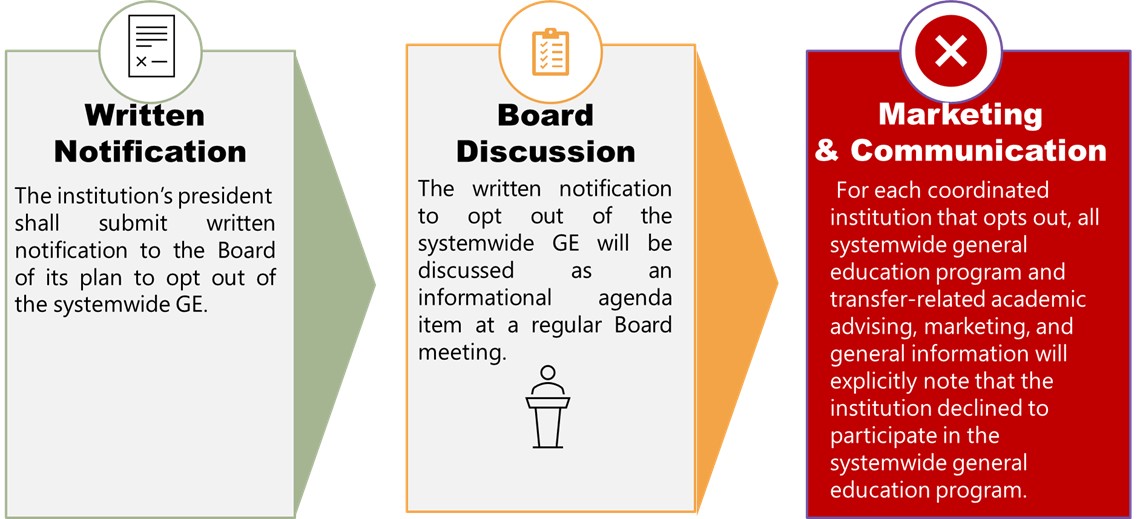General Education Council
- Kara Wheeler - Allen Community College
- Aron Potter - Coffeyville Community College
- Gaile Stephens - Emporia State University
- Brad Will - Fort Hays State University
- Troy McCloughan - Fort Scott Community College
- Cathy Almai-Mahurin - Johnson County Community College
- Brianne Heidbreder - Kansas State University
- Melinda Roelfs - Pittsburg State University
- Jennifer Roberts - University of Kansas
- Beth O'Neill - Washburn University
- Linnea GlenMaye - Wichita State University
1. How did the Systemwide General Education start?
At the end of FY 2020, the Board expressed a strong desire to develop a more robust system-based approach to facilitate student transfer. Building on this vision, in FY 2021 and 2022, the Board established a goal to develop a systemwide general education (GE) package under a common framework. When framing this goal, the Board instructed Board staff to develop a system-based GE package that would maximize the application of credit throughout the system, simplify processes for transfer students, and remove barriers for transfer students.
At the outset of this work in September 2020, 14 out of 15 states in the central United States had some variation of a systemwide GE, with Kansas being the outlier without a systemwide GE. From September 2020 to May 2022, a GE working group consisting of 19 faculty and administrators from community colleges, universities, and one technical college, a nine-member GE implementation working group consisting of registrars and transfer academic advisors, and detailed feedback from institutions helped shape the GE framework and its related policies.
The policy revisions and additions pertaining to GE and the application of transfer GE credit were approved by the Board on June 15, 2022.
2. What policy additions and revisions were approved by the Board?
First, a new policy, the Systemwide General Education Program policy (Chapter III.A.18), creates a systemwide GE for the state universities, community colleges, and Washburn University. Most notably, this details the common system framework (disciplines, core subjects, and credit hours) that each institution will adopt, establishes institutional reporting requirements, and creates a GE Council, which will be responsible for reviewing institutional reporting, issuing recommendations regarding requests for certain majors to deviate from the GE requirements, and investigating student and institutional complaints relating to the systemwide GE program and its application to the Transfer and Articulation policy.
Second, revisions were also made to the Transfer and Articulation policy to detail how the systemwide GE program applies to transfer students. These revisions are detailed in a new section titled Transfer of Systemwide General Education Requirements (Chapter III. Section A.2.g.). The new language provides guidance around transfer coursework in relation to program and institution-specific GE English and communication courses. Additionally, it also outlines how GE transfer credit works for students who completed the systemwide GE and did not complete the systemwide GE.
3. Who is participating in the systemwide GE?
The six state universities and the participating coordinated institutions (for this policy, this includes the community colleges and Washburn University) will implement the systemwide GE. It should be noted that technical colleges have a statutorily defined technical function that limits their degree offerings to the Associate in Applied Science degree, which requires significantly less GE and is not primarily designed for transfer. Thus, technical colleges will not participate in the systemwide GE.
4. What degrees are included in the systemwide GE?

5. Can institutions participate in certain parts of the Systemwide GE Program policy and the Transfer of Systemwide GE Requirements policy section and not participate in other parts of these policies?
No. State universities are required to comply with every aspect of both policies. Unless a coordinated institution has opted out, coordinated institutions are also required to participate in every aspect of both policies.
6. If a coordinated institution has determined that it will opt out of participating in the General Education Program policy and the Transfer of Systemwide General Education Requirements policy section, what is required and how will this information be documented?

